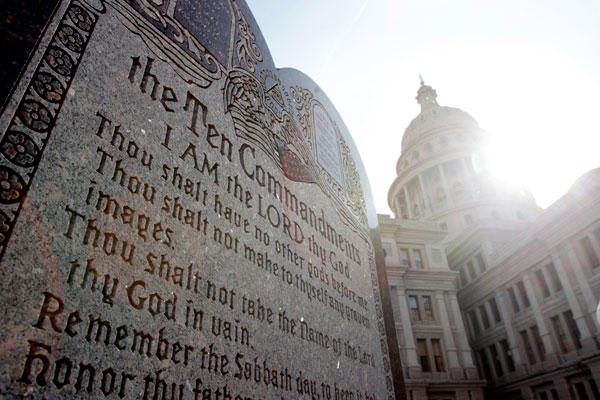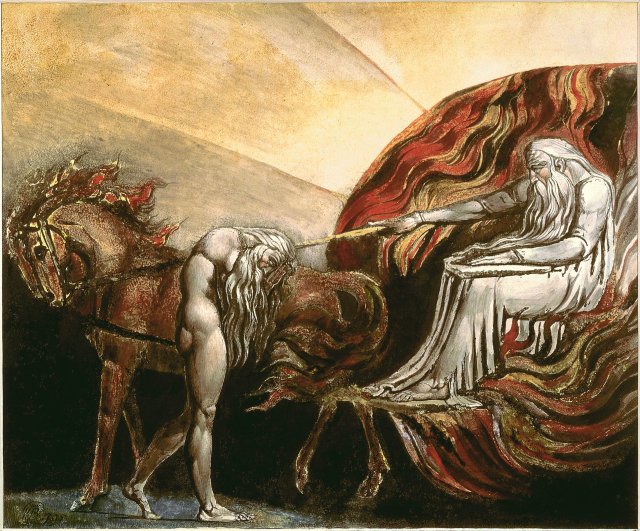As previously mentioned in my response to J. Lee Grady’s “7 Things That Prove God Is Real,” if we were to refer only to the Old Testament and not the New, I don’t think many people would think God was very good even if he did exist. The way I see it: The Bible is not very good proof of any god’s existence, much less a very good god. Just read the Old Testament, flip around a bit, and feel free to tell me what you think.
I say that as if reading the Bible isn’t incredibly cumbersome — really, unless you were raised on it or you have a shitty new translation, you’re probably not going to dig it, so, in this series I am going to attempt to highlight at least some of the passages that left me with a bitter taste in my mouth. (Full disclosure, I was raised listening to and reading the Bible throughout most of my formative years, so I’m going to jump around a bit rather than going from start to finish so we can keep to a central theme.)
Recently, I was reading the book of Amos and I began to draw parallels between the characteristics of his god and those of an obsessive, possessive, jealous, and, overall, abusive spouse. In the particular passage I was reading, the Lord is reprimanding the Israelites for the callous and uncharitable way they treat the poor, for their idleness, and for their arrogance — for such unseemly actions by the chosen people I could agree that they were in need of a stern talking to.
But this stern talking to revealed a few actions that the Lord was guilty of Himself — though I’m sure He wouldn’t see it as guilt on His part. But I’ll let Him speak for Himself:
I gave you empty stomachs in every city and lack of bread in every town, yet you have not returned to me. I also withheld rain from you when the harvest was still three months away. I sent rain on one town, but withheld it from another. One field had rain another had none and dried up. People staggered from town to town for water but did not get enough to drink, yet you have not returned to me. Many times I struck your gardens and vineyards, destroying them with blight and mildew. Locusts devoured your fig and olive trees, yet you have not returned to me. I sent plagues among you as I did to Egypt. I killed your young men with the sword, along with your captured horses. I filled your nostrils with the stench of your camps, yet you have not returned to me. I overthrew some of you as I overthrew Sodom and Gomorrah. You were like a burning stick snatched from the fire yet you have not returned to me. Therefore this is what I will do to you, Israel, and because I will do this to you, Israel prepare to meet your God. (Amos 4:6-12, NIV — The New International Version, or NIV, is one of the shitty new translations I was talking about earlier, but for our purposes, it’s good enough)
tl;dr? This can be summed up by saying, “I have hurt you in the past when you didn’t return to me and if you continue to turn from me, I’ll hurt you again.”
Remember this is God speaking; the same God whose mercy endures forever. In case you’re confused, I should point out that this isn’t merely the god of the Jews, this is the god of the Christians (of all flavors; Catholic, Lutheran, Baptist, Methodist, Orthodox, etc.) and the Muslims (though they’re working from different source material that I would argue isn’t much better).
Imagine for a moment the contemptible position taken up by apologists who argue that man’s free will comes into play here. They might argue that it was the Israelites’ choice and they were being punished for this choice. Any debate on free will aside, this seems to be the same logic held by that of a foreman towards his slave on a plantation in the old south of the United States; “Sure, you’re free to run, but when I catch you I’m going to break your legs if I don’t kill you first.” You’re free to do as you wish, as long as it’s what the Lord wishes, because if it’s not then you’d better “prepare to meet your God.” Is the will free when being prompted by the threat of a lash, wrath, or hellfire?
The evolutionary biologist, Richard Dawkins, commented in his book, “The God Delusion,” that,
The God of the Old Testament is arguably the most unpleasant character in all fiction: jealous and proud of it; a petty, unjust, unforgiving control-freak; a vindictive, bloodthirsty ethnic cleanser; a misogynistic, homophobic, racist, infanticidal, genocidal, filicidal, pestilential, megalomaniacal, sadomasochistic, capriciously malevolent bully.
This shotgun blast of criticism requires some unpacking. Many people I know simply do not understand how accurate this description is. It’s not merely a criticism, it’s a description that only someone incredibly ignorant of the scripture (or very foolish) would deny. In this series, The Lord Thy God, I will attempt to back up similar criticisms and descriptions of the god of the Bible and in this article I’ll be focusing on how God is jealous and proud of it.
Provided below are examples that I feel fit the description by professor Dawkins on the matter — I’ve provided the citation of the passages so you can read them in context. If you reach the conclusion that the Lord was justified in these actions I suggest you check out this website.
The Ten Commandments
Do you know the ten commandments? Don’t murder, don’t commit adultery, don’t steal… those seem to be the important ones, but do you remember the rest? How about the first few? (Spoiler: Those aforementioned are not the first few)
I am the Lord thy God, which have brought thee out of the land of Egypt, out of the house of bondage.
1. Thou shalt have no other gods before me.
2. Thou shalt not make unto thee any graven image, or any likeness of any thing that is in heaven above, or that is in the earth beneath, or that is in the water under the earth. Thou shalt not bow down thyself to them, nor serve them: for I the Lord thy God am a jealous God, visiting the iniquity of the fathers upon the children unto the third and fourth generation of them that hate me; And shewing mercy unto thousands of them that love me, and keep my commandments.
3. Thou shalt not take the name of the Lord thy God in vain; for the Lord will not hold him guiltless that taketh his name in vain.
(Exodus 20: 2-7, KJV)
That’s 3 out of 10 commandments that regular jack-offs site as being the foundation of morality and law and they have nothing to do with morality. They’re entirely all about God flexing His muscles and reminding us that He’s the boss. (At least he gives us a day-off on the weekends as his 4th commandment – even if it’s primarily, again, a bit theocentric.)

Because having a set of arbitrary religious injunctions in front of a secular courthouse is totally constitutional.
The rest of the commandments aren’t so bad, honoring mommy and daddy, not envying your neighbor’s ass (or his wife’s ass); but what about the kids? There’s no commandment not to rape, molest, or abuse children, no commandment to help the sick, poor, or hungry, nothing telling us not to enslave others, etc.
Anton LeVay, founder of the Church of Satan, saw a problem with the 10 Commandments and issued the 11 Satanic Rules of the Earth and included, “9. Do not harm little children.” Sure, the book was written in the 1960’s and it had the original 10 to respond to, but these give us a bit more to work off of than YHWH’s did (who is supposedly all-knowing, all-powerful, all-good, etc.).
I’m convinced that God is less concerned with the well-being of his people and more concerned with his reputation — even when he’s giving his followers a code to live by.
Serious Jealousy Issues
I’m not just inserting my, or Dawkins’ view, into the text here. The Bible says ad nauseam how jealous God is. Read it for yourself!
For the Lord your God is a consuming fire, a jealous God. (Deuteronomy 4:24, NIV)
In Deuteronomy it’s repeated again and again (e.g. 5:9, 6:15, 32:16, 32:21). And in the book of Joshua, the main protagonist goes so far as to say “You are not able to serve the Lord. He is a holy God; he is a jealous God. He will not forgive your rebellion and your sins.” (Joshua 24:19, NIV)
At one point in Exodus the writer even says:
Do not worship any other god, for the Lord, whose name is Jealous, is a jealous God. (Exodus 34:14, NIV)
Granted, the first 5 books of the Bible (Genesis, Exodus, Leviticus, Numbers, and Deuteronomy) were supposedly written by Moses and Joshua (whose book follows the first 5) was Moses’ successor, perhaps their view of God was slightly skewed.
Or maybe not. We see Judah stir up God’s jealousy in 1 Kings 14:22 and in Chapter 8 of Ezekiel the prophet attempts to give a justification for the wrath that God has allowed to fall upon the Jews. What was it that moved God to his actions? Guess. God’s jealousy is mentioned again and again throughout Ezekiel.
In the book of Psalms, the psalmist speaks about how there were those who had “angered him with their high places” and “aroused his jealousy with their idols” (Psalm 78:58, NIV). The psalmist is moved in his next psalm to ask, “How long, Lord? Will you be angry forever? How long will your jealousy burn like fire?”
Perhaps in answer to that question the minor prophets remind us,
The Lord is a jealous and avenging God; the Lord takes vengeance and is filled with wrath. The Lord takes vengeance on his foes and vents his wrath against his enemies… Who can withstand his indignation? Who can endure his fierce anger? His wrath is poured out like fire; the rocks are shattered before him. (Nahum 1:2, 6, NIV)
Neither their silver nor their gold will be able to save them on the day of the Lord’s wrath. In the fire of his jealousy the whole earth will be consumed, for he will make a sudden end of all who live on the earth. (Zephaniah 1:18, NIV)
God is supposedly omnipotent, omniscient, omnibenevolent, and all sorts of other long o-words — but jealous? That’s not an o-word and it’s an incredibly petty emotion; it’s so human. Maybe, just maybe, we make gods in our image and not the other way around.
If God is so great, I am left wondering: y so jelly tho?


